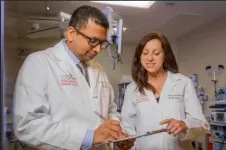(Press-News.org) During the pandemic, contact tracing apps kept Americans informed of potential exposure risk with the goal of reducing infections. But did apps like this help reduce the spread of COVID and how might we improve these apps for use in future outbreaks?
Contact tracing is a pivotal part of pandemic preparedness. Evidence-based research on best practices for contact tracing is important because when employed inefficiently contact tracing drains resources. Used effectively, contact tracing slows the spread of disease and saves lives. In the past, contact tracing was done through health departments contacting people, but the rapid spread of COVID-19 led to deployment of digital contact tracing applications to manage high infection rates and notify people automatically.
In a new study, researchers at Mason’s College of Public Health, Kevin Cevasco, a PhD in Public Health student concentrating in epidemiology, and his advisor and Professor of Public Health Amira Roess, found that digital contact tracing applications during the COVID-19 pandemic were not used to their full potential due to lack of adoption among larger populations.
“Contract tracing apps are important because they notify us that we if were near an infected person and we take action to protect ourselves and others. However, they were not adopted by enough of the population to be effective. This research helps reveal why that is, which will help understand how we can use them to their fullest potential in the future,” said Cevasco.
With the COVID-19's declaration as a National Public Health Emergency ending on May 11, the Virginia Department of Health (VDH) stated DCTs will also be retired.
“The end of the emergency declaration is a natural point in time for a contact tracing app program evaluation, but there is no U.S. regulatory authority tasked to evaluate if these apps were safe and beneficial,” said Cevasco. “Our findings can still be used to improve the design and deployment of crowd-sourced public health applications that rely on voluntary broad uptake.”
Digital contact tracing apps, or DCTs, use technologies like Bluetooth to alert users when they are at risk for potential disease exposure. The goal of DCTs was to assist with the shortage of health department workers who did manual contract tracing. Now that the apps are being retired, public health researchers are exploring their effectiveness and what findings may mean for future pandemic preparedness. The study concluded such apps were ineffective in their goal because they required the ability to connect to nearby phones, which was made impossible given such low adoption.
Barriers to adoption included privacy concerns, lack of interest, detection accuracy, and distrust of perceived government surveillance.
“We found that only a small percentage of the population used contact tracing apps,” said Cevasco. “These apps can only work if significantly more people across the entire country to use them.”
Safe use of DCT apps after adoption is a concern. Among those few people who did use contact tracing apps many reported that they frequently visited friends and family members, did not wear masks, did not have health insurance, were lonely during the pandemic, and thought they have/had the coronavirus. The high volume of social visits warrants further investigation, and this insight could help improve design of future interventions
“Contact tracing apps might be useful as part of pandemic response in more targeted populations such as within a company, on a university campus, or between health system workers and clients,” Cevasco said.
At present, no regulatory governmental agency exists to regulate the safe and efficient use of DCTs and Cevasco’s research provides a method for post-pandemic app evaluation. In the U.S. few Americans used contact tracing apps, despite the significant funds that leaders put towards it, this highlights that policy is often not evidence based.
Adaptation and Utilization of a Postmarket Evaluation Model for Digital Contact Tracing Mobile Health Tools in the United States: Observational Cross-sectional Study was published in Public Health Surveillance in March 2023.
This research was funded by the Institute for BioHealth Innovation at George Mason University and the TD Charitable Foundation.
END
Mason College of Public Health researchers reveal how digital contact tracing applications can be utilized now that the pandemic is over
New digital contact tracing research has potential to influence policy improvement surrounding mobile health
2023-06-20
ELSE PRESS RELEASES FROM THIS DATE:
UNCG spin-off launches national study to help prevent opioid misuse
2023-06-20
Prevention Strategies received a grant from the National Institutes of Health to pursue the study and develop a commercially viable intervention tool based on prevention science. Known as WorkWell, it is a tailored mobile health app that represents the next generation of evidence-based, technology-aided intervention programs.
The initial pilot program to test the WorkWell app will focus on construction trade workers and nurses, as well as nursing assistants and technicians. These occupations have been disproportionately impacted by the opioid crisis and have high mortality ratios.
“Opioid-involved overdoses are among the leading causes of death in the United States despite extensive ...
UTHealth Houston study on repeated radiofrequency ablation in combination with chemotherapy for pancreatic cancer supported with $3.3M HHS grant
2023-06-20
A combination strategy of endoscopic ultrasound-guided radiofrequency ablation (EUS-RFA) with chemotherapy for pancreatic cancer will be studied at UTHealth Houston through a $3.3 million grant from the National Cancer Institute by the U.S. Department of Health and Human Services.
The survival rate of pancreatic adenocarcinoma, or pancreatic cancer, remains low, around 10%, because of its poor response to current chemotherapies.
The five-year grant will continue the established six-year clinical and translational research collaboration between Jennifer Bailey-Lundberg, ...
Breast cancer research team pulls in $3 million in national support
2023-06-20
UTHSC researchers working to find new treatments to combat breast cancer metastasis recently pulled in a major national award. Wei Li, PhD, distinguished professor of Pharmaceutical Sciences and director of the Drug Discovery Center in the College of Pharmacy, and Tiffany Seagroves, PhD, professor of Pathology in the College of Medicine, are principal investigators on a $3.07 million grant from the National Cancer Institute for a project to develop a new series of drugs targeting microtubules to stop the spread of breast cancer to the brain and bone. Duane Miller, PhD, professor emeritus, and Zhongzhi Wu, PhD, assistant professor, both in ...
Science in the shadows: NASA selects 5 experiments for 2024 total solar eclipse
2023-06-20
A total solar eclipse will darken a swath of North America as the Moon blocks the light of the Sun for a few minutes on April 8, 2024. In addition to casting a breathtaking, passing shadow over the heads of millions of people, this total solar eclipse gives scientists a unique opportunity to study the Sun, Earth, and their interactions.
NASA will fund five interdisciplinary science projects for the 2024 eclipse to make the most of this opportunity. The projects, which are led by researchers at different academic institutions, will study the Sun and its influence on Earth with a variety of instruments, including cameras aboard high-altitude research planes, ham radios, and ...
Dupilumab lessens disease in COPD patients with type 2 inflammation
2023-06-20
BIRMINGHAM, Ala. – Chronic obstructive pulmonary disease patients with type 2 inflammation saw rapid and sustained improvements in their disease after treatment with the monoclonal antibody dupilumab, according to a yearlong, Phase 3 clinical trial reported in the New England Journal of Medicine.
These improvements — as measured by a significantly lower annualized rate of acute exacerbations, significantly better lung function and quality of life, and significantly less severe symptoms than placebo-treated adults with COPD — were observed within two to four weeks after the initiation of dupilumab and were sustained throughout the 52-week trial period. This monoclonal antibody ...
Scientists discover new embryonic cell type that self-destructs to protect the developing embryo
2023-06-20
Scientists studying gene activity data of the early human embryo have discovered an overlooked type of cell which self-destructs within days of forming, as part of a quality control process to protect the developing foetus. The findings give insights on what happens at the very first stages of life after fertilisation which could in the future help improve IVF or regenerative medicine treatments.
A new study published on 20 June 2023 in PLoS Biology by an international team of scientists including researchers at the University of Bath, finds that our earliest development in the womb may be rather different to what we have always assumed.
While ...
National Geographic Explorers win award for visualizing arctic climate change
2023-06-20
FOR IMMEDIATE RELEASE: June 20, 2023 - Washington, D.C. - An innovative virtual reality project created by National Geographic Explorers in collaboration with local communities was recognized with the “Best in Category: Visualize” during the XR Prize Challenge: Fight Climate Change earlier this month. The project, “Qikiqtaruk: Arctic at Risk” was selected for the award from across 150 submissions at the Augmented World Expo (AWE) in Santa Clara, California on June 1, 2023.
“Qikiqtaruk: Arctic at Risk” brought together researchers, park rangers, educators and immersive content ...
NYU Abu Dhabi researchers develop first-of-its-kind adhesive bandage that can detect COVID-19 antibodies
2023-06-20
Abu Dhabi, UAE, June 20, 2023: Researchers at NYU Abu Dhabi have developed a new rapid testing method for COVID-19 – an adhesive bandage that relies on gold nanoparticles to quickly detect the immune antibodies in the bloodstream.
These antibodies, named IgM and IgG, are naturally produced as a result of SARS-CoV-2 infection, and therefore serve as valuable biomarkers to identify infected individuals and monitor the spread of pandemics. The innovative bandage technology is affordable and easy-to-use, and ...
Alissa Park appointed Dean of UCLA Henry Samueli School of Engineering and Applied Science
2023-06-20
Ah-Hyung “Alissa” Park has been appointed the Ronald and Valerie Sugar Dean of the UCLA Henry Samueli School of Engineering and Applied Science, effective September 1.
One of the nation’s leading experts on carbon capture and conversion technology, Park is currently the Lenfest Earth Institute Professor of Climate Change and chair of the department of earth and environmental engineering at Columbia University, where she has been a faculty member since 2007. She also is director of the Lenfest Center for Sustainable Energy, an executive committee ...
Research identifies factors that make correcting misinformation about science more successful
2023-06-20
In an article titled “A Meta-analysis of Correction Effects in Science-Relevant Misinformation” published in the journal Nature Human Behaviour, University of Pennsylvania social psychologists and communication scholars Man-pui Sally Chan and Dolores Albarracín explain the circumstances under which corrections of misinformation about science are most likely to work or fail, as well as the characteristics of the corrections most likely to succeed.
The authors conducted a meta-analysis, a quantitative synthesis of prior research, which involved 60,000 ...
LAST 30 PRESS RELEASES:
The hidden breath of cities: Why we need to look closer at public fountains
Rewetting peatlands could unlock more effective carbon removal using biochar
Microplastics discovered in prostate tumors
ACES marks 150 years of the Morrow Plots, our nation's oldest research field
Physicists open door to future, hyper-efficient ‘orbitronic’ devices
$80 million supports research into exceptional longevity
Why the planet doesn’t dry out together: scientists solve a global climate puzzle
Global greening: The Earth’s green wave is shifting
You don't need to be very altruistic to stop an epidemic
Signs on Stone Age objects: Precursor to written language dates back 40,000 years
MIT study reveals climatic fingerprints of wildfires and volcanic eruptions
A shift from the sandlot to the travel team for youth sports
Hair-width LEDs could replace lasers
The hidden infections that refuse to go away: how household practices can stop deadly diseases
Ochsner MD Anderson uses groundbreaking TIL therapy to treat advanced melanoma in adults
A heatshield for ‘never-wet’ surfaces: Rice engineering team repels even near-boiling water with low-cost, scalable coating
Skills from being a birder may change—and benefit—your brain
Waterloo researchers turning plastic waste into vinegar
Measuring the expansion of the universe with cosmic fireworks
How horses whinny: Whistling while singing
US newborn hepatitis B virus vaccination rates
When influencers raise a glass, young viewers want to join them
Exposure to alcohol-related social media content and desire to drink among young adults
Access to dialysis facilities in socioeconomically advantaged and disadvantaged communities
Dietary patterns and indicators of cognitive function
New study shows dry powder inhalers can improve patient outcomes and lower environmental impact
Plant hormone therapy could improve global food security
A new Johns Hopkins Medicine study finds sex and menopause-based differences in presentation of early Lyme disease
Students run ‘bee hotels’ across Canada - DNA reveals who’s checking in
SwRI grows capacity to support manufacture of antidotes to combat nerve agent, pesticide exposure in the U.S.
[Press-News.org] Mason College of Public Health researchers reveal how digital contact tracing applications can be utilized now that the pandemic is overNew digital contact tracing research has potential to influence policy improvement surrounding mobile health







